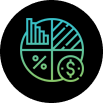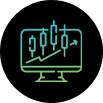FXEM - EMPIRE MARKETS - Forex Trading
To access the website's classic version and the new accounts, please click here
FXEM Forex Trading Advantages

50+ Global Currency Pairs
Majors, Minors, Exotics

World-Class Trading Platforms
Meta Trader 5

Deep Liquidity
Big pool of buyers & sellers

Ultra-Fast Order Execution Speed

Tight, Competitive Spreads
Live Market Prices
Forex Trading Hours
The trading hours for Forex are from Monday to Friday. Please note that Daylight Saving Time may apply. The trading hours start at 00:05 and end at 23:50.
The indicative spreads are calculated on an average basis throughout the day and tend to be narrower under normal market conditions. However, spreads may widen due to important news announcements, political uncertainty, unexpected events leading to volatile market conditions, or at the close of the business day or weekends when liquidity is lower.
In the case of overnight trades, clients will pay or obtain a certain amount based on the difference in interest rates between the two currencies in the currency pair, e.g., USDJPY. This process is known as a "swap," and the difference is automatically converted into the deposit currency in the trading terminal. Swap-Free accounts are exempted. Our Swap-Free Account is fully compliant with Sharia law and is available for residents of Islamic countries. The minimum level for placing pending orders at the current market price is determined by the instrument.
About Trading the Global FX Markets
Forex trading is a global market that operates 24 hours a day, five days a week. It involves exchanging one currency for another, with the goal of making returns from changes in exchange rates. The Forex market is the largest financial market in the world, with an estimated $6.6 trillion in daily turnover, according to the latest research by the Bank for International Settlements.
The market is open to large financial institutions and individual retail and professional traders. In the past, Forex trading was mostly the domain of banks, hedge funds, and other large institutions. However, advances in technology and financial instruments like Contracts for Differences (CFDs) have made it much easier for individual traders to participate in the market.
Today, anyone with an internet connection, a willingness to learn how to trade, and a trading account can trade currencies online. The basic process is relatively simple: you deposit funds into your account, and then use those funds to place orders on currency pairs via our trading platform, using a variety of tools and strategies to analyze the market and make trading decisions.
One of the advantages of Forex trading is that it is a highly liquid market, meaning that there are always buyers and sellers willing to trade. This makes it relatively easy to enter and exit positions, even in large amounts. Additionally, the market is highly volatile, which means that there are often opportunities for traders to gain from price movements. The modern system of floating rates was established after World War II and remains in effect today. Before that, the Bretton Woods Agreement tied exchange prices to the reserves of gold held by the countries involved in each transaction.
The Forex trading marketplace is the largest and most liquid in the world, due in part to factors like online transactions, global travel, and modern communication and transportation. As our world becomes increasingly interconnected, the need for currencies to be traded against one another only grows. That's why the Forex trading marketplace is so dynamic, liquid, and responsive.
Retail foreign exchange traders, or individuals who participate in online Forex trading, are one of the fastest-growing segments of the market. They trade currencies for speculative reasons or to hedge against unwanted currency risk. They typically open a trading account with a broker or a bank, which allows them to buy and sell currencies online or over the phone. When you trade through a broker like Empire Markets, you'll receive live, current pricing for the Forex market and have the choice to decide when to buy or sell, executing your trades with a few mouse clicks. Are you ready to get started?
FAQ's
In Forex trading, exotic currency pairs refer to currency pairs that consist of one major currency and one currency from a developing or emerging economy. These pairs are less frequently traded than the major currency pairs and may have wider bid-ask spreads and higher volatility. One example is the USDZAR (US Dollar/South African Rand). The USD is a major currency, while the ZAR is the currency of an emerging market economy. This pair is less frequently traded than the major currency pairs like the EURUSD or USDJPY.
Minor forex pairs, also known as cross-currency pairs, are currency pairs that do not include the U.S. dollar. These pairs are made up of the currencies of two major economies other than the U.S. and are less commonly traded than major currency pairs. Examples of minor forex pairs include the Euro vs. the British Pound (EURGBP), the Euro vs. the Swiss Franc (EURCHF), and the British Pound vs. the Japanese Yen (GBPJPY).
Major currency pairs are the most traded currency pairs in the foreign exchange market. These pairs include the U.S. Dollar as one of the currencies and are often paired with other major currencies such as the Euro, British Pound, Japanese Yen, Swiss Franc, Canadian Dollar, and Australian Dollar. These pairs are highly liquid and have tight bid-ask spreads, making them popular among traders and investors. The major currency pairs are the most frequently traded because they are the widely used in international trade and commerce, making them an important barometer of global economic activity.
The difference in the bid and ask prices on currency pairs is called the spread, which can change according to different factors such as market openings and closings. Empire Market’s ultra-fast order execution speed secures your positions at the time you open or close them, giving you access to the best prices.
The forex market has a diverse range of participants who engage in buying, selling, and exchanging currencies for various purposes. The main participants in the forex market include central banks, commercial banks, hedge funds, institutional investors, corporations, retail traders, and speculators.
Central banks play a crucial role in the forex market by setting monetary policy and controlling the supply of money in the economy, while commercial banks carry out currency transactions for their clients. Hedge funds and institutional investors trade currencies on behalf of their clients or their own portfolios, while corporations engage in forex transactions to manage currency risk and facilitate international trade.
Retail traders, or individual investors, have access to the forex market through online trading platforms and can buy and sell currencies. The forex market's diverse range of participants creates liquidity, making it one of the most accessible and dynamic markets in the world.
Forex trading software is a computer program that provides currency price quotations and enables traders to open and close trades on currency pairs. Forex software comprises a range of tools and features, such as real-time market data, charting and technical analysis tools, order management, and risk management tools. It can also automate trading strategies, allowing traders to execute trades automatically based on pre-defined rules and criteria. Forex software can be downloaded and installed on a trader's computer or accessed through a web browser or mobile app.
The forex market is influenced by a variety of factors that can cause fluctuations in currency prices.
- Supply and demand for a particular currency, which can be influenced by economic data such as GDP, inflation, employment rates, and trade balances.
- Political events, such as elections and policy decisions, can also have a significant impact on forex prices.
- Central banks play a crucial role in the forex market by setting interest rates and implementing monetary policy, which can affect the value of a currency.
- Market sentiment, or the overall attitude of traders towards a currency, can also impact prices, as can global events such as natural disasters, conflicts, and pandemics.
- Technical factors, such as traders acting on chart patterns, trading volumes, and market volatility, can also influence forex prices.
Successful forex traders need to stay informed about a wide range of economic, political, and social factors that can impact currency values.
Forex trading involves opening and closing positions on currency pairs like the EURUSD. A trader could purchase the pair at the current exchange rate of 1.1800, for example, which means that one euro is worth 1.1800 US dollars at the time of opening the position. The first currency in the pair is called the 'base currency', in our example it's the EUR. The second currency is called the 'quote currency', in our example it's the USD. The trader could decide to hold, sell, or buy the currency pair in accordance with their financial goals.